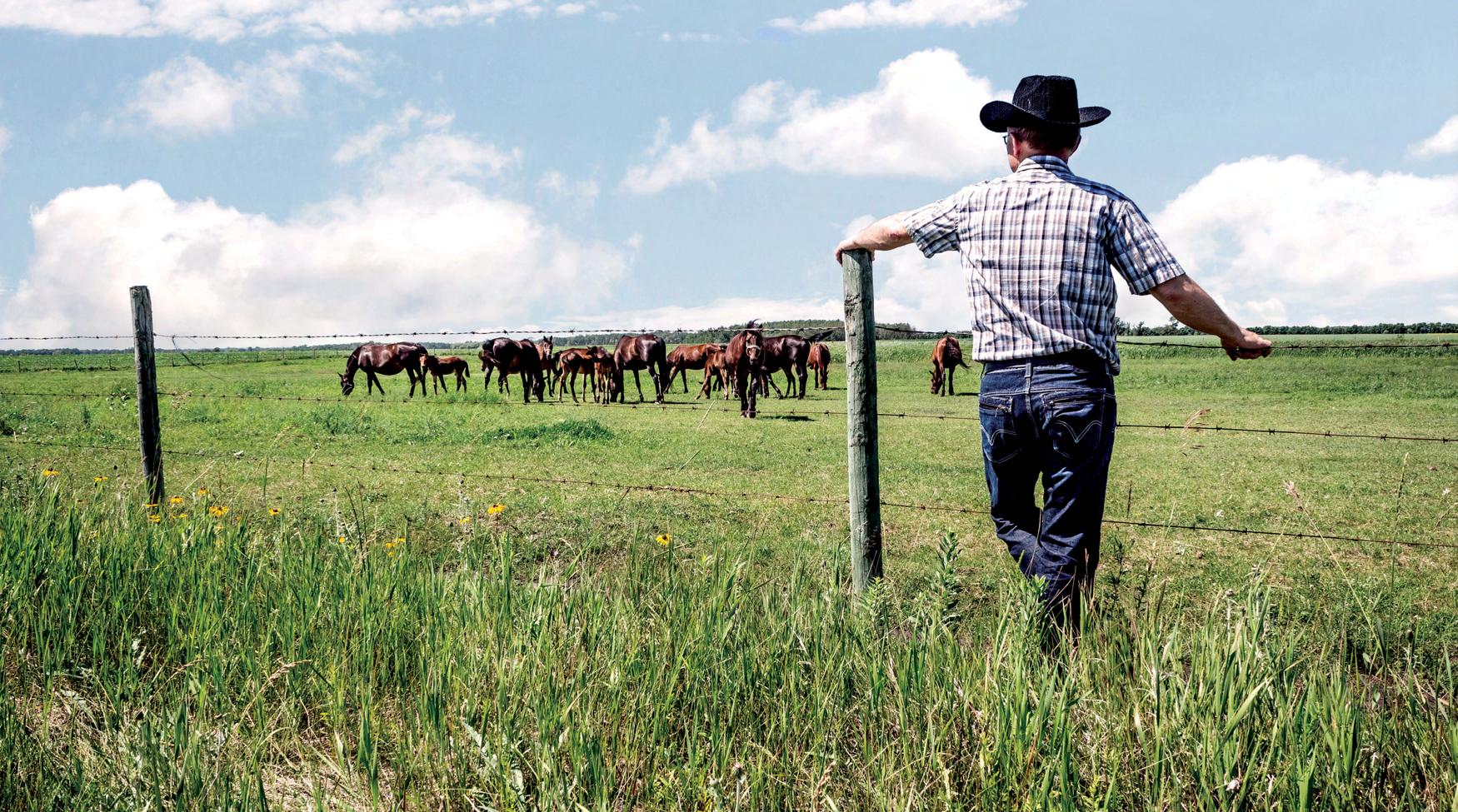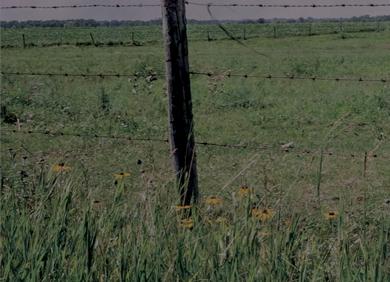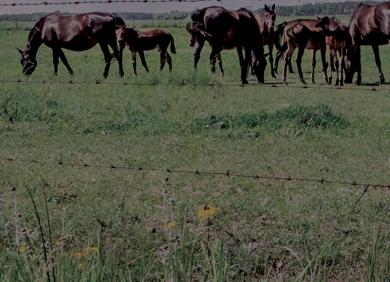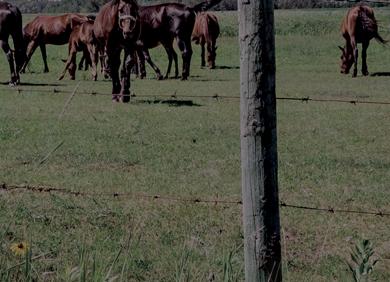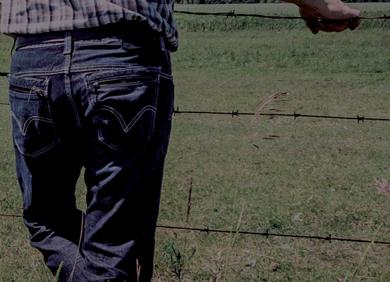8 minute read
Paving the Way: A Conversation with RLI’s Women In Land
Next Article
by Kat Szymanski, RLI Marketing Manager
One of the most highly rated events at this year’s National Land Conference, were the Roundtables. Among them, the “Women of Land” table, led by Renee Harvey, ALC had three packed sessions. It was clear the women of RLI are eager to engage with each other on matters concerning business and land.
So, what’s on women’s minds when it comes to land real estate and how are they impacting the industry?
RLI members Karen Foster, ALC, Renee Harvey, ALC, Hallie Myhre and Allison Worrell, all part of the Roundtable, share the challenges and advantages of being a woman in land real estate and how to bring others along for success.
What inspired you to pursue a career in land?
Renee: I didn’t have a choice. When I started, I lived in a town of 3,000. I still do. My contacts were either farmers or ranchers. Prior to getting a real estate license, I had a solicitor’s license to sell insurance. Even before I was out of college, I sold crop insurance. My clients, that’s who they were—farmers and ranchers. I was steeped in that. It was my knowledge base, far more than residential. Back when I started in real estate houses sold for 30K to 40K. When you live in a small town, you don’t have many to sell. So, I sold land.
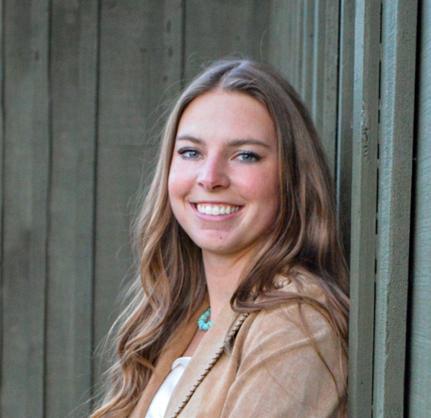
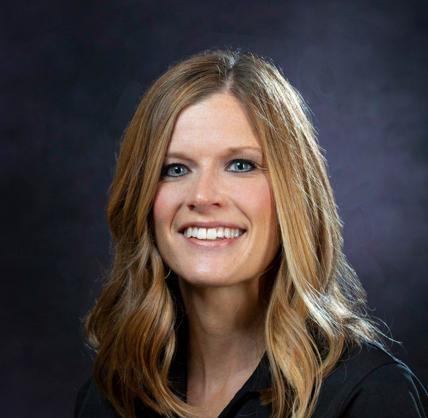
Hallie: When I was in college, western photography was a hobby. In 2019, I started doing photography for my current broker. It evolved into marketing and then managing her website. I went on listing appointments and helped with anything that didn’t involve needing a license. I had no plans of getting into real estate—I went to school for agriculture and business—but I really admired my broker Christy Belton, ALC. Land and ranch real estate combined a lot of my interests. My senior year of college I decided to get my real estate license and I’ve been working with Christy ever since. It was unexpected, but exciting.
Karen: I’ve been a REALTOR® in southern Indiana for 40 some years. I was single most of my life and needed to make money, so I sold homes. I always had a farm background though—I live on a fifth-generation farm—and so I started selling my friends’ farms. I sold four good-sized farms to developers. One day after a closing, my client told me they really hoped the property would have sold to another farmer instead of becoming a bunch of houses. I thought to myself, “Holy cow, I wasn’t even thinking that route.” So, I made a goal that I’d sell farms for the highest and best if that’s what sellers wanted but if someone wants the property to stay a farm, I want to help my clients do that.
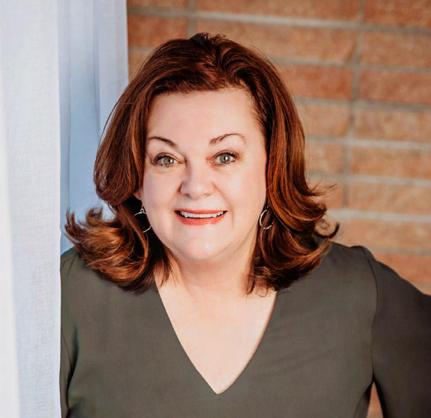
Allison: Like Renee, I don’t know that I had a choice. My father-in-law owned the business, so Luke and I purchased it from him. I worked the first 8 years in the business in marketing-type roles, then a little over a year ago I got my own license. My heart behind doing that was in our area there are a lot of female landowners, many who are widows. Their husbands were more entrenched in the day-to-day so when the husbands passed, it created a lot of stress and unknowns. Some didn’t feel comfortable working with men. Our agency decided we needed a female agent for women that might be able to relate better to a woman instead of one of the guys on the team. That was my personal motivation.
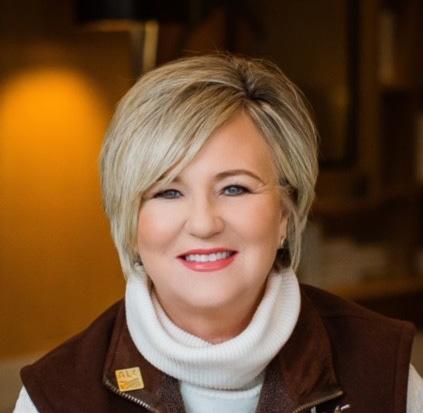
How do you handle negotiations and client relationships differently as women? Or do you?
Hallie: In terms of negotiations, not only am I a woman, but I’m also young. People assume I am only an assistant or in a supporting role, most assume my broker is a man, and some even assume I am just a little girl who doesn’t know anything about real estate at all. It can be easy to dwell on those assumptions. However, I find these differences can be empowering. It’s often been an advantage in negotiations. People get a non-threatening feel from me. It’s helped me negotiate good deals for my clients. When maybe if I was a more threatening figure, it wouldn’t have gone as well. That’s not all cases but in some it’s helped. People don’t expect me to have the knowledge and confidence that I have. It can be because of gender or age or both.
Renee: In my immediate market, they knew that I knew what I was talking about. When you go outside of your area, or buyers come in from other places, they are surprised that what they have to work with is a woman who knows about land. We’ve had to be educated more, have a deeper knowledge base. Particularly with clients you have to win over. You have to know soils; you have to know costs to replace a mile of fencing. That’s not something you can guesstimate. They know. They know if you’re trying to buffalo your way through to get a sale. Women must have a deeper knowledge base and work a little bit harder to win over those that Hallie was talking about. We’ve all been there in our career, where we’ve had something to prove.
Karen: Renee said so much. It’s so true. I love that we can save certain buyers from failure. They think they will buy a piece of ground and build a property, but they don’t understand that it’s $6K to run a mile of fencing. They want all black board fence. Man, that’s expensive. They don’t understand soils. You need to know topography, waterways, soil types. I have three pages of questions I ask sellers. 95% of the time people will say, I’ve never had an agent ask me these kinds of questions. RLI teaches us those things and brings them to the top, so we can be more professional.
Karen brought up a good point about RLI’s education and women needing to know more. Allison, have you found that to be true?
Allison: Once landowners find us, it’s easy to prove ourselves to them. My challenge has been with male agents who aren’t part of RLI. Within RLI there’s an elevated sense of understanding and respect. I had a deal come together in an area where there are no women land brokers. They weren’t used to working with me. There’s no title I wear prouder than Luke Worrell’s wife, but one guy couldn’t take the time to remember my name, so that’s what he called me: “Luke’s wife.” I had to be more polished, more prepared. I was able to show them my competency. They just weren’t used to it.
What I would say to other women in land is: Don’t be afraid. The path has been paved by the generations before us. My generation is widening that path. Hallie’s generation will make it even wider. A lot of those obstacles are becoming less. We’re showing that we are a valuable add to the market. I can’t think of a field that hasn’t benefited from men and women partnering together.
Renee, you led the Women in Land Roundtables at NLC. What was on those women’s minds when it comes to land real estate? What do they worry about?
Renee: Safety. It came up in every session in Denver. In our market you will find yourself in very remote areas. Most don’t have cell service. So, we must be keenly aware of our safety. We are as much at risk as residential agents going to a vacant house. We tend to think we’re invincible, but we’re not. We need to be more proactive at letting other people (coworkers, family) know where we are. Also, education. We sometimes don’t know about local networks and events. The information isn’t disseminated. We need to be aware and share with others. If you think you might be one of the few women in the room at an event, bring somebody with you. Norma Carleton, ALC and Wendy Johnson, ALC from Texas are great at that. They don’t live in the same area, but they travel together, go to education sessions together. It helps to not feel like the only woman in the room.
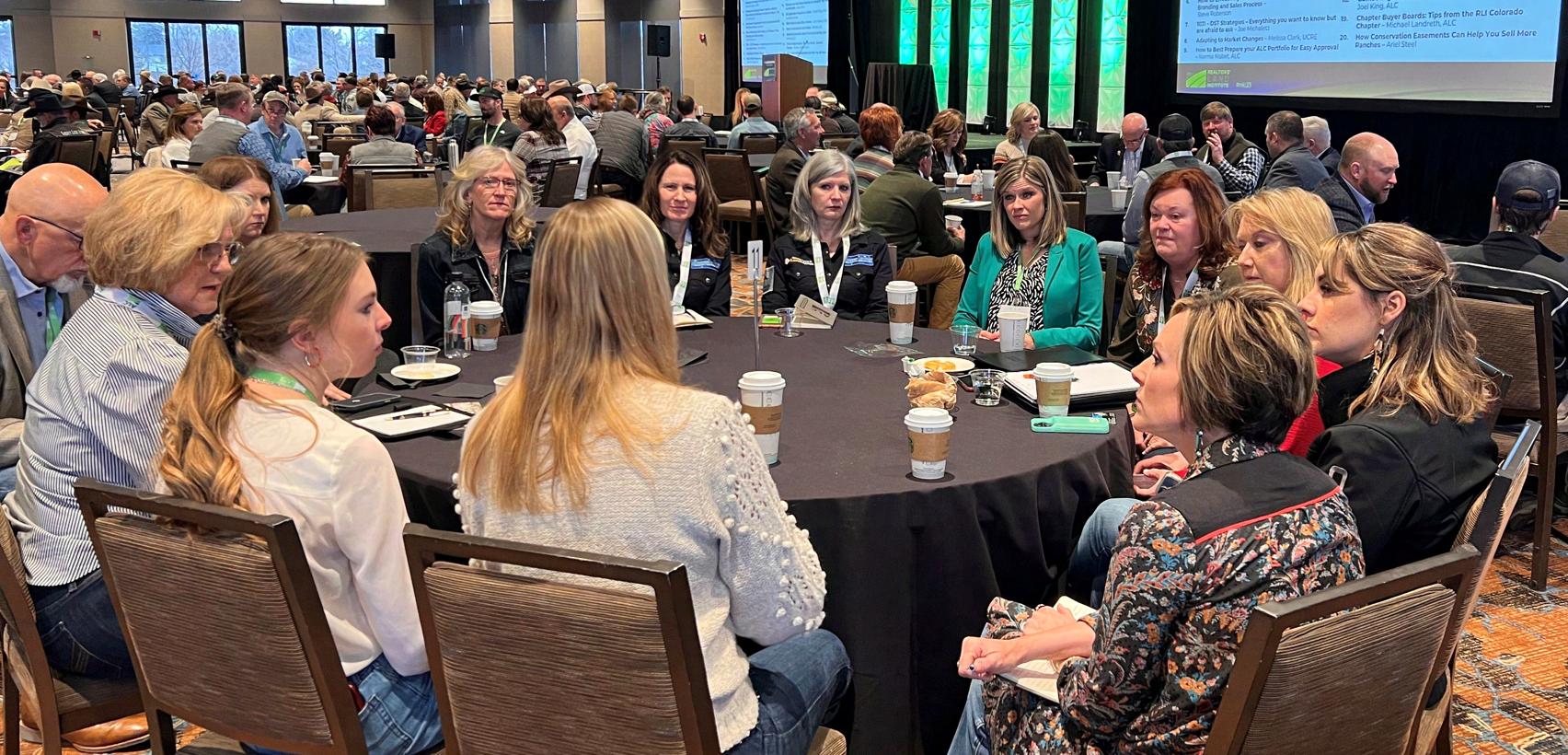
Allison is right, the way is being paved but there are still pockets where we are a minority.
Hallie: My broker prepped me for a lot of things about being a woman in this industry, but it was good to be at the roundtable hearing what others are thinking about. A lot of it resonated with me. Some things I hadn’t thought of before. I was nervous since it was my first Land Conference. I didn’t talk much. Being at that roundtable gave me confidence to sit at other tables and talk. It was one of my favorite parts of Conference.
Allison, were you surprised by anything that came out of the discussion?
Allison: Not surprised. Like Hallie, I left very inspired. Women sometimes get a bad rap as being caddy or competitive. We were each other’s cheerleaders in that conversation. There was so much great idea sharing. It wasn’t long enough.
What might next steps for women of RLI look like?
Allison: If there were more chances for that connectivity during the year, it would be incredible. We’re in the business of helping clients. If we can facilitate more opportunities to bounce ideas off each other, we can resource each other to better serve them.
Renee: When Aubrie reached out about leading the roundtable, I never dreamed it would have the kind of success it had. They weren’t always well attended. Three full sessions were encouraging. Instantly these groups grew legs and had open dialogue. I see us possibly creating a group from the folks who came to the roundtables. A Facebook group maybe? I’m not sure what it looks like, but I know that’s its needed and wanted and will be utilized. It would be interesting to get feedback from the men, too.
How do men fit in to this?
Renee: They’re looking for the magic potion, too. Allison talked about running a business with Luke. There’s a work life balance when you and your spouse are in the business together. It brings on a whole set of concerns on how to manage that. We could all learn from that.
The popularity of your Roundtable, does it signify a shift? Are more women coming into the industry, are they more interested in connecting? What’s happening?
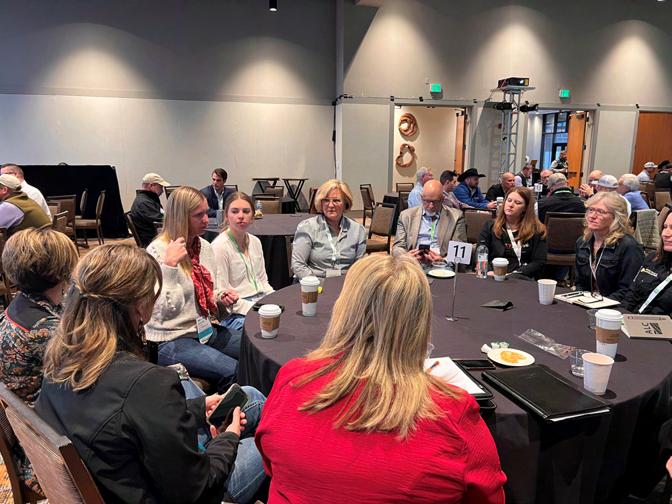
Karen: It’s a combination of everything. RLI is growing.
Renee: It’s connectivity, expertise, and professionalism all rolled into one.
What’s your best advice to women who want to get into this industry?
Karen: Know your stuff. If can prove you’re of equal competency, you’ll have a better chance.
Allison: Come twice as prepared. Twice as knowledgeable. Twice as professional. Be ready understanding it’s not a given that you’ll get the business.
Renee: Perseverance. Don’t let one situation defeat you. We’re in it for the long game. If you consistently go, you’ll get the opportunity. It will become your turn.
Hallie: For young people, have the confidence that you’ve worked hard to be where you are. Don’t let other people shake you. You deserve the success you’ve obtained. Being a young woman that’s important.
Renee: We consciously need to be in the business of empowering other women in our field. We overlook that. Instead of being critical let’s bring others along. We want to be the shoulders that someone stands on to see farther.
Karen: And…always bring your muck boots! I got a listing a few weeks ago because they said the other agent came in heels and I was wearing boots. I got it over the other person because I was dressed more appropriately.
And toilet paper. Bring toilet paper.
If you’re interested in learning more about potential activities for women in land and how to get connected with other women at RLI, contact Kat Szymanski at kszymanski@rliland.com.

